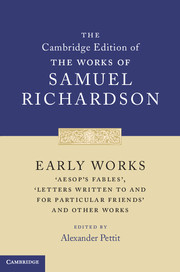Book contents
- Frontmatter
- Dedication
- Contents
- General Editors’ Preface
- Acknowledgements
- Chronology
- List of Abbreviations
- General Introduction
- Textual Introduction
- The Apprentice’s Vade Mecum (1733)
- A Seasonable Examination of the Pleas and Pretensions (1735)
- Preface to Aubin, A Collection of Entertaining Histories and Novels (1739)
- Aesop’s Fables (1739)
- Letters Written to and for Particular Friends (1741)
- Six Original Letters Upon Duelling (1765)
- Appendix: The Infidel Convicted (1731)
- Postscript
- Emendations
- Word-division
- Bibliographical Descriptions of Early Editions
- Explanatory Notes
- Index
Letter LXV
Published online by Cambridge University Press: 30 June 2022
- Frontmatter
- Dedication
- Contents
- General Editors’ Preface
- Acknowledgements
- Chronology
- List of Abbreviations
- General Introduction
- Textual Introduction
- The Apprentice’s Vade Mecum (1733)
- A Seasonable Examination of the Pleas and Pretensions (1735)
- Preface to Aubin, A Collection of Entertaining Histories and Novels (1739)
- Aesop’s Fables (1739)
- Letters Written to and for Particular Friends (1741)
- Six Original Letters Upon Duelling (1765)
- Appendix: The Infidel Convicted (1731)
- Postscript
- Emendations
- Word-division
- Bibliographical Descriptions of Early Editions
- Explanatory Notes
- Index
Summary
Against too great a Love of Singing and Musick.
Dear Cousin,
I am sure you have the good Sense to take kindly what I am going to mention to you, in which I can have no possible View but your Benefit. When you were last with me at Hertford, you much obliged us all, with the Instances you gave us of your Skill in Musick, and your good Voice. But as you are so young a Man, and seem to be so very much pleased yourself with these Acquirements, I must enter a Caution or two on this Score, because of the Consequences that may follow from too much Delight in these Amusements, which, while they are pursued as Amusements only, may be safe and innocent; but when they take up too much of a Man's Time, may be not a little pernicious.
In the first place, my dear Cousin, these Pleasures of Sound, may take you off from themore desirable ones of Sense, and make your Delights stop at the Ear, which should go deeper, and be placed in the Understanding. For whenever a chearful Singer is in Company, adieu to all Conversation of an improving or intellectual Nature.
In the second place, it may expose you to Company, and that not the best and most eligible neither; and by which your Business and your other more useful Studies, may be greatly if not wholly neglected, and very possibly your Health itself much impaired.
In the third place, it may tend, for so it naturally does, to enervate the Mind, and make you haunt musical Societies, Operas and Concerts;and what Glory is it to a Gentleman if he were even a fine Performer, that he can strike a String, touch a Key, or sing a Song with the Grace and Command of a hired Musician?
Fourthly, Musick, to arrive at any tolerable Proficiency in it, takes up much Time, and requires so much Application, as leaves but little Room, and, what is worse, when delighted in, little Inclination for other Improvements: And as Life is a short Stage, where longest, surely the most precious Moments of it, ought to be better imploy’d, than in so light and airy an Amusement.
- Type
- Chapter
- Information
- Early Works'Aesop's Fables', 'Letters Written to and for Particular Friends' and Other Works, pp. 397 - 399Publisher: Cambridge University PressPrint publication year: 2011

